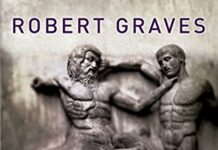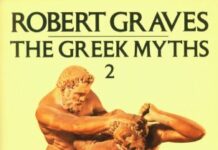
Ebook Info
- Published: 2014
- Number of pages: 290 pages
- Format: PDF
- File Size: 55.71 MB
- Authors: Robert Graves
Description
The I, Claudius author’s “lightning sharp interpretations and insights . . . are here brought to bear with equal effectiveness on the Book of Genesis” (Kirkus Reviews). This is a comprehensive look at the stories that make up the Old Testament and the Jewish religion, including the folk tales, apocryphal texts, midrashes, and other little-known documents that the Old Testament and the Torah do not include. In this exhaustive study, Robert Graves provides a fascinating account of pre-Biblical texts that have been censored, suppressed, and hidden for centuries, and which now emerge to give us a clearer view of Hebrew myth and religion than ever. Venerable classicist and historian Robert Graves recounts the ancient Hebrew stories, both obscure and familiar, with a rich sense of storytelling, culture, and spirituality. This book is sure to be riveting to students of Jewish or Judeo-Christian history, culture, and religion.
User’s Reviews
Reviews from Amazon users which were colected at the time this book was published on the website:
⭐The Hebrew Myths is an odd little book, not aimed at the narrow or faith-based reader, even though its subject matter, as its subtitle indicates, is the Book of Genesis. Generally dry and scholarly, The Hebrew Myths is nonetheless an enjoyable read and can be strongly recommended—but, like Graves’s The Greek Myths, it most often simply catalogue tales and is disinclined to interpret them; it often therefore seems to be a reference work, and yet it’s a book to read more than once. I find it tricky to summarize, in large part because its two authors, Robert Graves and Raphael Patai, pull us in two different directions: both work to expand our comprehension of Genesis, but Graves does so by connecting its themes and archetypes to analogues from myths and legends of non-Hebraic cultures; while Patai conversely brings in extra-biblical Hebraic material from, e.g., the Oral Torah. The “Graves” portions thus tend to promote a recognition that Genesis is a product of a much broader human community than we are commonly led to believe; while the overall result of Patai’s contributions is a clear reminder that the ancient Hebrews regarded Genesis, not as static and literal, but rather as fluid and symbolic. By the way, the data for the Kindle edition suggests that this book was published in 2014, so note that Graves died about 30 years ago and the ink-and-paper version of this book dates at least to back 1964. Thus, it would be a mistake to regard The Hebrew Myths as a reaction against more recent assertions from scriptural literalists.A pair of examples from The Hebrew Myths that I found especially interesting: (1) the authors (but principally, I assume, in this case, Patai) regard the Genesis patriarchs, not as individuals, but as tribes. Thus, when Genesis reports that so-and-so traveled from A to B, this should be read, according to these authors, as representing the migration, not of one individual, but of a people. Patai and Graves are unequivocal in asserting that all such journeys (for instance, that of Abram from Ur) represent the movements of large human populations. Thus, we can by extension read “brothers” in Genesis as referring to kindred or neighboring tribes, which in turn means each time that a younger son inherits in Genesis, we can read that as meaning a more recently arrived or invading people took possession of a region. Likewise, it becomes possible to see the incredibly long lives of Genesis ancients as reflecting, perhaps, dynasties or periods of cultural dominance. Needless to say, all such readings overturn our conventional, “modern” readings of Genesis, even while, at the same time, they return to Genesis a more plausible historicity.(2) The authors assert (and in this case, I assume the principal is Graves) that the incident wherein Ham accidently sees the nakedness of his father, Noah, and then is severely punished for that inadvertent glimpse, should be read as an analogue of, e.g., the myth of the castration by Kronos of his father, Uranus. I found this comparison initially jarring, but (a) as we already know that the Noah story contains many passages obviously lifted straight from the more ancient Gilgamesh epic; and (b) as a castration theme does indeed explain the baffling severity of Ham’s punishment, we must, I think, take Graves’s derivation to heart: the Noah story must indeed contain a fragment of this far more ancient mythical material, but in a bowdlerized (one might even say “castrated”) form which we now find oddly inexplicable. The result, again, of Graves endeavor is that we now begin to see Genesis, not as a singular revelation, but as a fluid and symbolic product of the ancient Mediterranean region as a whole: a diverse, multicultural, and very well integrated global community.
⭐Robert Graves has been one of my favorite authors ever since I read “I Claudius.” Again, I am reminded why he is after reading this book. He, and his co-author, provides an erudite and well researched analysis of the Book of Genesis showing how it redacted regional myths to conform to Josiah us religious reforms, explain the fate of the Hasmonean dynasty, the coming of Greek and, more importantly, Roman dominion and finally give Rabbinic Judaism, through the Midrash and Talmud the fodder for its commentary and ethics. It also shows the inherent tension between a literal interpretation of the Bible and, more reasonable, view of it as myth.
⭐Errata:• Ch3, p36: Change “Ma ‘on” to “Ma’on”.• Ch3, p37: Use em dash in “God’s arm-though some”.• Ch6, p47: Change “rescue of Israeli” to “rescue of Israel.”• Ch32, p168: Use em dash in “dry land-soundings of”.• Ch34, p177: Use em dash in “too-preferring”.• Ch35, p181: Change “ten yean” to “ten years”.• Ch40, p194: Change “birth right” to “birthright”.• Ch59, p271: Change “that song again I It is” to “that song again! It is”.• Ch59, p273: Change “grinds iron ban” to “grinds iron bars”.
⭐Everything arrived on time and as advertised
⭐Thank You!
⭐Digging deep into how many fragments of many creation stories became The Book of Genesis. This is an exhaustive amount of work. The results are a a very readable and interesting read..
⭐I find it amazing that even though I have studied Kabbalah for almost 20 years, there is always something new to find. The research that went into this book is incredible. We go from the Babylonian Ennuma Elish (which you should read before any other creation story) through to the Bible version to clear the way for a true understanding of “the” creation. It is a very good read!!
⭐Very dense and technical book. The author seems to be almost the omniscient scholar of reading ancient texts and scholars. Few conclusions are drawn for you, for the better. I read this book after the narrative masterpiece ‘I, Claudius’ by the same author.
⭐The book is now severely dated. Several of the presumptions made have been disproved by more recent Archaeological investigations. The Hyksos for example are now believed to be of Northern Egyptian origin and not Southern Levantine. However the book does give some insight into some of the entomology of the names found in Genesis and Grave’s personal views in regard to comparative mythology.
⭐Excellent expansion of anyone’s knowledge. And enjoyable.
⭐written in same style as he wrote the Greeks Myths. Easy to read – full of detail
⭐It was exactly as specified. I got it in good time.There was nothing wrong with the product.
⭐Excellent book – well worth a read.
Keywords
Free Download Hebrew Myths: The Book of Genesis in PDF format
Hebrew Myths: The Book of Genesis PDF Free Download
Download Hebrew Myths: The Book of Genesis 2014 PDF Free
Hebrew Myths: The Book of Genesis 2014 PDF Free Download
Download Hebrew Myths: The Book of Genesis PDF
Free Download Ebook Hebrew Myths: The Book of Genesis

